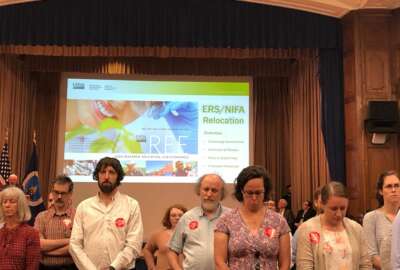
‘Never suggested we would not lose expertise,’ USDA says of upcoming relocation
Lawmakers have asked Agriculture Secretary Sonny Perdue to allow employees impacted by the upcoming USDA relocation to use telework and other flexibilities to...
Best listening experience is on Chrome, Firefox or Safari. Subscribe to Federal Drive’s daily audio interviews on Apple Podcasts or PodcastOne.
The Agriculture Department last week attempted to brush off concerns that the upcoming relocation of two of its research bureaus would create a problematic “brain drain” for the workforce, assuring lawmakers it had an aggressive hiring plan to combat anticipated attrition.
Roughly 58% of the employees at the Economic Research Service who had been chosen to relocate have declined, while 67% of the selected workforce at the National Institute of Food and Agriculture had also rejected USDA’s mandatory reassignments to Kansas City, the department said last week.
“We expect that for these kinds of moves,” Scott Hutchins, deputy USDA undersecretary for research, education and economics, said of the likelihood for high attrition at the two USDA components. “We will be working desperately and deliberately to make sure … that we do not drop the ball on the mission in the short term. I want us to keep an eye on the long term. I want us to keep an eye on the next version, with the expertise that we are retaining, [and] how we build on that and how we take these agencies to the next level.”
Six new ERS employees started Monday in Kansas City, Hutchins told the Senate Agriculture, Nutrition and Forestry Committee late last week.
USDA doesn’t have new permanent office space for the new ERS and NIFA headquarters in the region. The competitive bidding process for such space will continue through Aug. 7.
ERS and NIFA employees had until July 15 to inform USDA of their intent to accept or reject relocation to Kansas City. The totals USDA described last week may change, the department said, as employees have the option to change their relocation status through Sept. 30.
Employees who do choose to relocate are expected to report to Kansas City by that date.
But there is bicameral concern, mostly among Democrats, that USDA is rushing to either move or remove ERS and NIFA employees by the end of the fiscal year. Employees who have declined the USDA relocation are expected to leave their current jobs by Sept. 27.
“The administration could keep these experts from leaving by giving employees the flexibility to continue their important work here, until at least a permanent location is ready,” Debbie Stabenow (D-Mich.), ranking member of the Senate agriculture committee, said. “The location could extend the deadline for researchers to decide whether they will leave their jobs or relocate themselves and their families to a new city over 1,000 miles away. Instead, the administration is forcing out its employees with rushed, politically calculated ultimatums designed to derail important agricultural research, and I don’t say that lightly.”
Hutchins said the department would negotiate with the American Federation of Government Employees over allowing ERS and NIFA employees to telework for up to a year before making the move to Kansas City.
It was one of several demands AFGE local bargaining units made to the department last month. Members of Congress, including House Democrats from the national capital region, have also asked USDA Secretary Sonny Perdue to consider telework and other flexibilities.
“Although we remain strongly opposed to the decision to relocate ERS and NIFA, we ask that you consider the impacts it is having on federal workers, their health and their families, and that you do all you can to mitigate the extreme hardships now placed upon them,” Reps. Jennifer Wexton and Don Beyer (D-Va.), along with Reps. Jamie Raskin and Anthony Brown (D-Md.) and D.C. Del. Eleanor Holmes Norton, said in a July 17 letter addressed to Perdue.
Citing stories from “numerous” employees impacted by the USDA relocation, lawmakers also asked Perdue to expedite extensions to those who had requested them.
“One such extension request would allow a current employee undergoing chemotherapy to continue their treatment with their trusted team of physicians,” the letter reads. “Another extension was requested from an employee who is undergoing treatment for multiple sclerosis, which also requires comprehensive care from physicians.”
Bargaining negotiations between USDA and AFGE over these extensions, telework and other flexibilities began Friday. Both USDA and the ERS union tentatively agreed to ground rules for negotiations, Kevin Hunt, acting vice president for the ERS local union, said.
He said negotiations are expected to continue Wednesday and through this week, after acting ERS Administrator Ephraim Leibtag returns from his trip to Kansas City spent onboarding the six new employees.
Though much of the concern for the USDA relocation has come from Democrats, Senate Agriculture Committee Chairman Pat Roberts (R-Kan.) wanted assurance that the move wouldn’t impact ERS’ ability to publish analytic research.
“I assure you that we will seek more opportunity to expand the reach and influence of ERS through the use of considerable cost savings from this move,” Hutchins said at last week’s hearing. “That is our goal. Our intention is to make this … an opportunity for us to allow this agency to grow and be sustainable in the long term.”
Hutchins said the department was communicating on a weekly basis with employees impacted by the USDA relocation.
“We need to support our employees in a number of ways. That includes continuous communication. It includes being as decisive as we can on various aspects of things, and it means supporting them in every way possible,” he said. “We will continue this mission. We will have a difficult time — as I’ve said to others I’m not trying to sugarcoat the difficulty that this will pose — but we are actively working with the Office of the Secretary and all the agencies that can contribute to ensure continuity of mission.”
Copyright © 2025 Federal News Network. All rights reserved. This website is not intended for users located within the European Economic Area.
Nicole Ogrysko is a reporter for Federal News Network focusing on the federal workforce and federal pay and benefits.
Follow @nogryskoWFED




